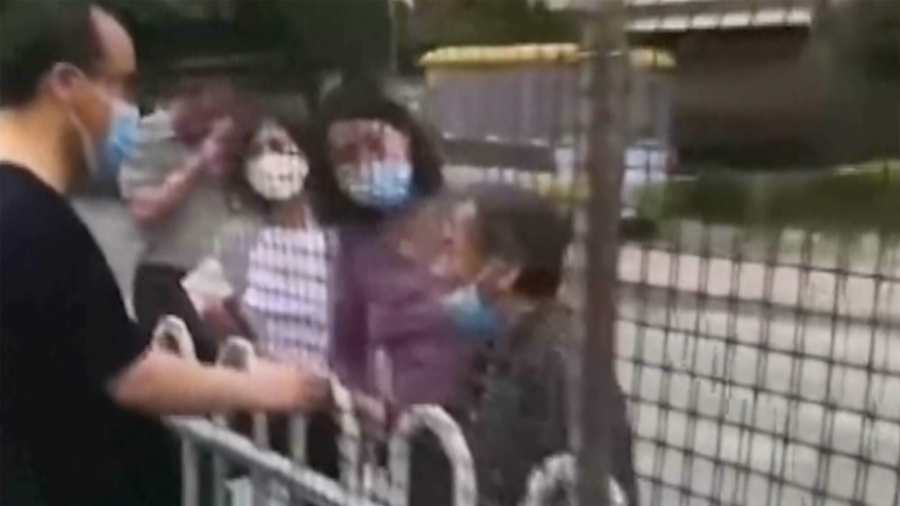BEIJING—The mayor of a northeastern Chinese city on the North Korean border that has been under lockdown for more than 50 days has apologized for failures in his administration’s work amid widespread—but often disguised—dissatisfaction over the authorities’ heavy-handed approach to handling the pandemic.
Dandong Mayor Hao Jianjun gave no specifics, but said the authorities’ work and basic services had been “unsatisfactory,” for which he offered his apologies, according to a statement issued by city leadership late Monday.
It is highly unusual for a ranking Chinese Communist Party (CCP) official to publicly concede errors, particularly regarding the hardline “zero-COVID” policy that has been repeatedly endorsed by top officials under CCP leader Xi Jinping.
Despite reporting only a handful of cases, Dandong has seen one of the strictest lockdowns in China.
The actual number of COVID-19 cases may be much higher. China’s COVID-19 data is difficult to verify, as the Chinese regime routinely suppresses or alters information.

In his reported comments at a meeting with residents, Hao acknowledged the sacrifices made by the city’s 2.4 million citizens, along with the “complaining voices” among them over the authorities’ work. Dandong would now be moving into a stage of pandemic control that would be more effective, Hao said.
Unable to root out the source of new cases, Dandong officials took increasingly extreme measures, some of them of questionable scientific merit. That included recommending residents close their windows to prevent the virus from being blown in from North Korea, even though its ability to spread through the air is extremely limited.
Authorities have also cracked down on smuggling across the Yalu River with North Korea, offering cash incentives for information on those involved. The Chinese regime has long held that the virus is spreading through packaging and other surfaces, despite little evidence showing that is a significant factor.
Officials at one point also transported residents of an entire apartment block to quarantine in the city of Shenyang, about 250 kilometers (150 miles) north of Dandong. Upon their release, it was discovered the positive case sparking the move had been in a resident of a neighboring building, leading to an angry confrontation between the residents and authorities.

Residents have been permitted out to shop, but no word has yet been given on when normal work can resume, said Li Yueqing, the owner of a wood processing factory in Dandong reached by phone. Rules still demand that any building where a positive case is found will be sealed off, Li said.
“We understand the epidemic situation in the city is still unstable. We don’t know when exactly we will be allowed to resume production,” he said.
A restaurant worker said the 50 days of closure is majorly affecting incomes.
“Up to now, we still haven’t received any instruction from the government on restarting business and our incomes have been affected by doing nothing,” said the worker, who gave only her surname, Guo.
A staffer at a maritime training academy who gave just his surname, Zheng, said they remained shuttered as a precautionary measure.
“The government feels it is better for us to remain closed longer, given the large number of trainees we have had. We have no idea when we will reopen,” Zheng said.
Lengthy lockdowns have become the norm in China’s COVID-19 response, with Shanghai’s ongoing predicament gaining the most notoriety. Most of the 25 million residents of China’s largest city and key financial hub were confined to their homes or immediate neighborhoods for two months or more and hundreds of thousands continue to remain under restrictions.

The severity of the Shanghai lockdown and the apparent lack of preparation by authorities prompted confrontations at checkpoints between residents and officials, and a series of nightly sessions of banging pots and screaming from balconies. Criticisms of the authorities’ policy were posted online, often in formats designed to thwart censorship software.
The relaxation of measures prompted an exodus from the city and foreign business leaders say confidence in its future as an international business hub remains in question.
The response in the capital Beijing has been more nuanced, possibly for political reasons, although many students have been forced to attend class online and a major shopping and nightlife district has been shut down following the detection of 287 cases linked to a nightclub.
Police said that two customers of the nightclub are under investigation after they allegedly ignored an order to isolate at home and went out using a ride-hailing service. They later tested positive, leading to more than 300 others being locked down.



